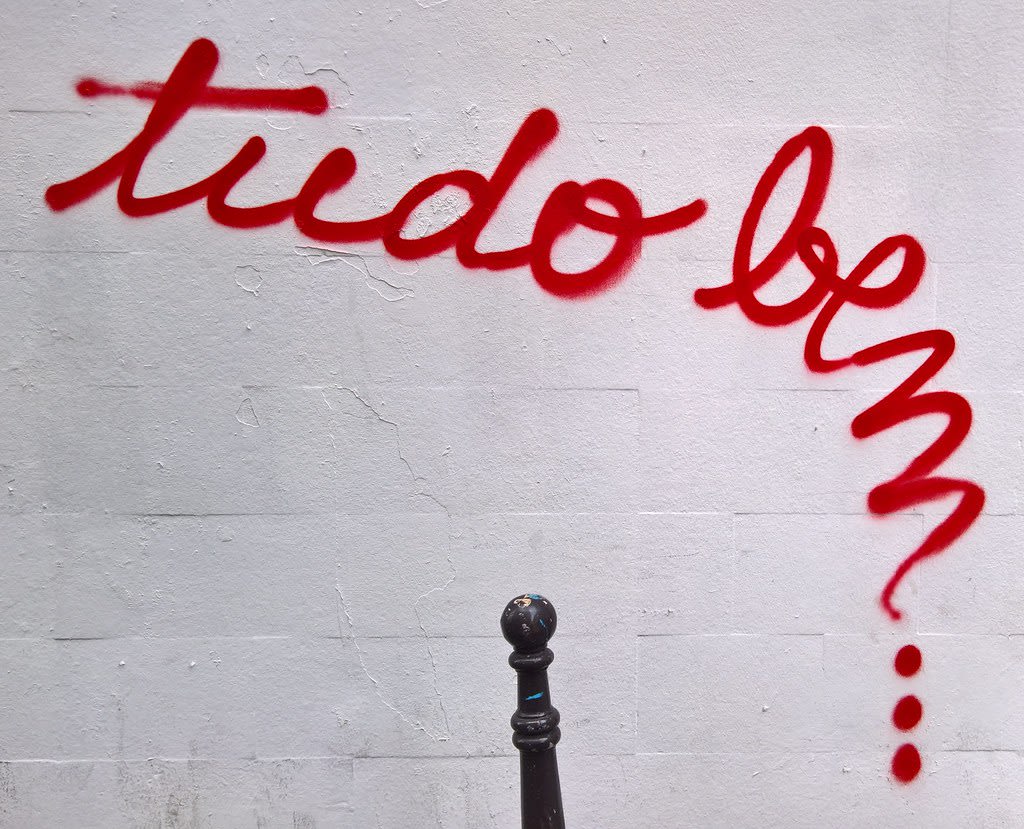
Tudo bem? or Tudo bom? is a simple, yet intriguing greeting that has been one of the most culturally interesting aspects of living in Brazil. You might be thinking, what is so interesting about these two words, but the greeting itself, when you translate it has much more of a significance than what you would think. I find it fascinating for a number of reasons, which I will divulge during this article—and it is important to keep in mind that languages, including English have different ways in which people can address each other from the very neutral to the very positive.
To give some background first, I have studied a few foreign languages thus far, and one of the first things you learn in any language are the greetings/salutations. The way you greet someone in another language can teach you a lot about the culture and also about the country. No one greeting is the same, although the meaning is usually quite similar. What has thrown me off about ‘Tudo bem?’ is not just the brevity of it, but the significance regarding its inherent positivity. I did not expect this greeting to be so prevalent, but I am fundamentally glad that it is used so regularly.
Let us start by breaking ‘Tudo bem?’ or ‘Tudo bom?’ down in terms of trying to translate it into English, which is not so easy on the surface. You would think it means ‘How are you?’, ‘How is everything going?’ but that is not the right translation. If we are to translate it into English, it would be more like, ‘All is well?’ or ‘Everything good?’. Instead of saying ‘Como vai voce?’ (How are you doing?) or ‘Como voce esta?’ (How are you?), I have been surprised to learn that these greetings are not as popular, while ‘Tudo bom?’ or ‘Tudo bem?’ are used frequently in polite greetings, whether it is with a shop keeper, bank teller, a cashier, or your neighbor from next door.
What I really like about ‘Tudo bem?’ or ‘Tudo bom?’ is that you are being positive and outgoing right from the start. Even if everything is just okay, or you might be having a bad day, it is almost expected to say in response ‘Tudo bem!’ or ‘Tudo bom!’ to indicate that everything is going well and you’re doing fine, even if that might not be the case. To me, this represents something very unique about Brazilian culture in terms of erring on the side of being positive and upbeat. Even if you are going through some tough times, or don’t think everything is alright, you are unconsciously drawn to saying that it is and to stay positive.
You do not have to always respond with ‘Tudo bem’ or ‘Tudo bom’, but during my time here, I have not really heard any answers in Portuguese with the equivalent of ‘I’m doing alright’, or ‘I’m doing okay’, or ‘I’m fine.’ Even rarer would be to say that you are not doing well, or you are sick, or you are tired. ‘Tudo bem?’ is a very casual greeting and it is usually only common to respond with the same reply or with a ‘bem’ (good), ‘bom’ (good), or even ‘tudo certo’ (all right). You don’t really say that you are doing amazing, fantastic, wonderful, or any other exuberant English equivalents when asked about ‘Tudo bem?’, but this kind of greeting in Portuguese is much more positive, and warm than I have encountered with other languages.
Greetings tend to be neutral at the outside when the person asking expects a positive answer, but the response can also be neutral or negative depending on the language used. However, I have found that Portuguese among the languages I know or have studied is the only one which leaves very little room for a neutral or negative response. I do believe that is a good thing, although it can be a bit difficult to express those emotions right away. It is kind of expected to start out any interaction on a positive note by saying ‘all is well?’ and ‘all is good?’. Unless you are with a family member or a close friend, it can be tough to really express how you truly feel, because they are likely not asking how you really are but will just try to be polite at the outset.
Regardless, when you compare Brazilian Portuguese to English or to Spanish, the initial greeting is much more positive in terms of the translation. While you can say ‘All is well?’ or ‘Everything good?’ in English, these are not really the initial greetings that you would use when you are talking to someone for the first time. It is much more common to say, ‘How are you?’ or ‘How are you doing?’ instead. Saying ‘Hello, all is well?’ or ‘Hello, everything fine?’ at the outside to an English speaker would be a bit strange at first, whereas ‘How are you?’ is much more of a common occurrence.
In my opinion, the same could be said with Spanish where you would address someone you have never met before with ‘Como estas?’ or ‘Como vas?’, which is a very similar translation from the English of ‘How are you?’ or ‘How are you doing?’ Now, you could do something similar in Spanish with a greeting of ‘Todo bien?’ which is similar to the meaning of ‘Tudo bem?’ in Portuguese. However, from my own experience, while ‘Todo bien?’ is more acceptable and can be heard from time to time, a more proper greeting in a first interaction with a native Spanish speaker is ‘Como estas?’ rather than ‘Todo bien?’ An exception would be if you had met that person before or a few times previously and consider them to be more than a stranger. That is when ‘Todo bien?’ would be used, but not really when you meet someone for the first time.
Lastly, even with Turkish, the last language I have learned, you would say to somebody new: ‘Merhaba, Nasilsin?’ (Hello, how are you?) similarly to English or Spanish, but there is no formal greeting used in the Turkish language where you would ask if everything is well right off the bat. In English, Spanish, or Turkish, it seems that the greeting to ask how someone is starts off as being very neutral in its meaning, whereas with Brazilian Portuguese, it is fundamentally a different story. Out of all the languages that I have learned and studied, the greeting of ‘Tudo Bem?’ is fundamentally the most optimistic and positive out of all of them.
I have to say that it took me aback at first when I arrived in Brazil how common it is, and how it is customary to reply with a ‘Tudo bem!’ or ‘Tudo bom!’ in reply, usually with a smile. It is a testament to the positive and upbeat culture, where even if you are having a bad day, and things aren’t going well, people here try to have a happy outlook on life and boost their spirits with a ‘Tudo bem?’ and a thumbs up. I am not a psychologist, but I can imagine that seeing someone smiling and wishing you a ‘Tudo bem?’ will do wonders for your day and for your overall mood.
If you can learn any two words in Brazilian Portuguese, I would recommend that you first use ‘Tudo bem(?)’, because they are probably the most important words in the language, and can both be a great question and a great answer to have under your belt as you navigate this fascinating and unique culture.
About the Creator
Ben W
Ben helps students from around the world to improve their English language skills. Ben enjoys traveling around the world, developing his writing abilities, and reading good books.






Comments
There are no comments for this story
Be the first to respond and start the conversation.